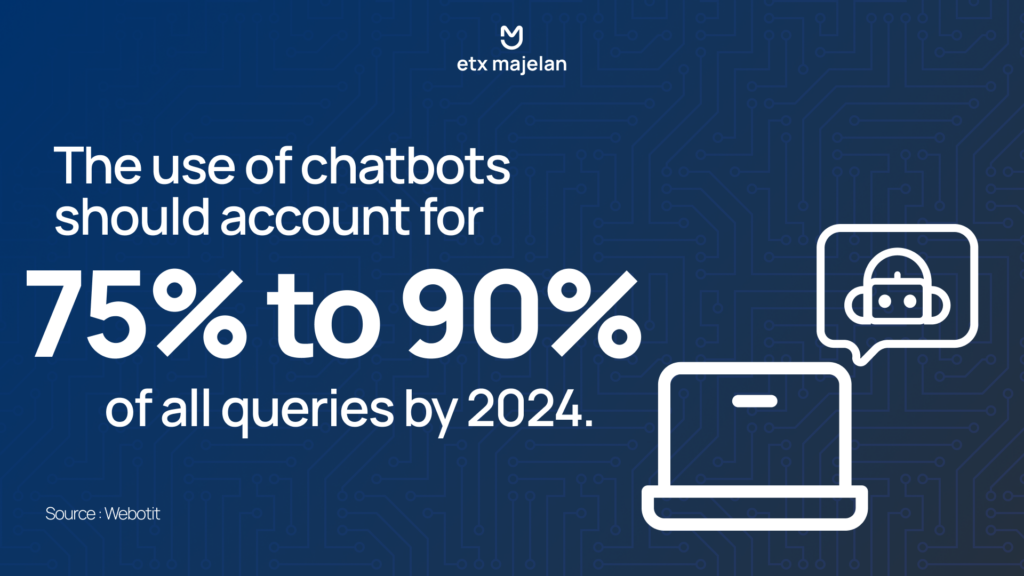Artificial intelligence has become a major catalyst for transformation in a variety of sectors, and the field of professional training is no exception. As technologies evolve at an accelerating pace, companies and learners are looking for more efficient and personalized ways to hone their skills and acquire new ones. That’s where AI comes in, offering innovative solutions that redefine the way training is delivered, managed, and consumed.
AI uses in L&D (learning & development)
In addition to automating certain tasks, such as summarizing documents and reports, and creating training aids (MCQs, QCUs, etc.), the integration of AI enables a wide range of actions to be taken to meet learners’ specific needs.
Personalized learning: using questionnaires, AI systems are able to assess a learner’s performance, detect strengths and weaknesses, and adjust training content accordingly. This approach, also known as Adaptive learning, enables learners to benefit from a personalized learning path tailored to their specific needs, to progress at their own pace.
Chatbots for pedagogical support: the use of chatbots should account for 75% to 90% of all queries by 2024 (source). Today, incorporating chatbots into customer service goes beyond efficiency and satisfaction. It also conveys an innovative image of the company that integrates them. In the field of training, AI-powered chatbots can be implemented to assist learners 24/7, particularly in the absence of human trainers. They are capable of answering common questions, guiding learners during their training courses, and offering personalized assistance.

In 2023, US e-learning company Coursera launched Coursera Coach, a virtual assistant powered by generative AI and designed to answer users’ questions and share personalized feedback in real time. The coach can provide quick video course summaries and resources, such as a recommended clip, to help learners better understand a specific concept. It can also communicate in different languages and for any level of education, creating a more inclusive and engaging experience for learners around the world.
Predictive analysis of training needs: just as it is possible to assess employee performance and existing skills within a company, AI can also track market trends to anticipate future training needs. This approach enables training organizations and companies to anticipate the skills required and design suitable training programs in advance.
Simulations and virtual reality: integrating AI can significantly reduce costs and enrich training simulations by making scenarios more dynamic and authentic. Virtual reality (VR), powered by AI, offers deeper immersion and more responsive interactions, proving particularly beneficial for practical training in more manual trades. Virtual reality training simulates employees’ professional environment, enabling them to :
- become familiar with the field,
- assimilate techniques and processes,
- train in difficult and unusual situations.
Many international companies have already adopted virtual reality in their training processes, following the example of Delta Airlines, which has implemented VR training for its flight attendants that includes simulations of various emergency scenarios, such as medical emergencies, fires and evacuations, enabling flight attendants to practice these often exceptional procedures in a realistic, simulated environment.

Automated assessment and instant feedback: AI systems can automatically assess learners’ performance on assigned tasks and provide immediate feedback. This enables learners and trainers to quickly adjust their approach and improve their skills.
Data analysis for continuous improvement: AI can analyze data generated by learners, such as response times, frequent errors, etc., to identify areas where training can be improved. This contributes to the continuous improvement of training programs for specialized platforms as well as for their users.
Recommendation systems: using machine learning algorithms, training platforms can recommend personalized content to learners based on their preferences, past performance, and industry trends.
AI-assisted content translation (text and audio): AI can now translate a company’s internal content at reduced cost, facilitating the international distribution of training content for learners who speak a different language. With no language barrier to overcome for learners, training platforms and companies, the potential for more learning materials is proving invaluable.
Today, AI not only automates the translation of text-based materials in a matter of seconds but can also instantly translate audio-visual content. We now have automatic video translation, with the original voice of the trainer or expert preserved. This innovation transcends language barriers, offering learners an immersive experience while maintaining the integrity of the content.
Artificial intelligence is redefining the training landscape by offering innovative solutions that improve the efficiency, accessibility and personalization of learning. By leveraging AI capabilities, organizations can create learning experiences that are more dynamic, engaging and focused on learners’ individual needs.
However, as with all sectors transformed by AI, it is crucial to consider the ethical implications associated with the use of AI in training. Transparency in AI processes and the protection of learners and corporate data are fundamental aspects that require a cautious approach. The influence of AI in every sector has become an inescapable power, which, combined with human intelligence, is opening up promising horizons in the working world.
At ETX, we know that professional training is at the heart of companies’ and employees’ concerns. It’s not easy for employees who are often on the road to find the time to train and keep up to date with internal communications. According to a study carried out by the Gipa Institute, 59% of professional drivers who spend more than 2 hours per journey by car consider it a waste of time, and 59% of professional drivers expect an improvement in the quality of their business trips. To meet this need, we have created Majelan Pro, a solution that enables companies to keep in touch with their mobile employees, by offering them premium audio content, enabling them to be informed, trained and entertained in complete safety.






